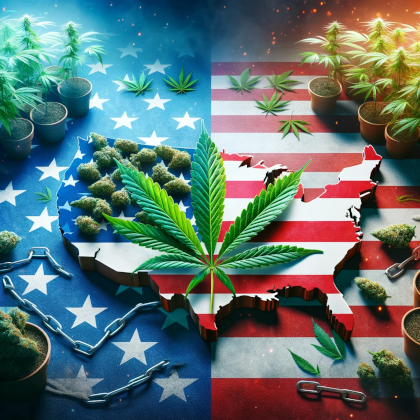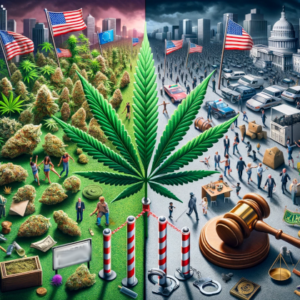
Why Cannabis’s Federally Illegal Status is a Nationwide Problem
You might be wondering: if 75% of the United States have legalized cannabis, and if more continue to do so, does it really matter if marijuana remains federally illegal? Sure–it’s a burden to patients who need care in states that haven’t updated their laws, but if those states come around, like so many others have, what’s the need for federal action?
In fact, marijuana’s federal status has created an absolute nightmare for cannabis businesses operating in legalized states, as well as for the cannabis industry nationwide. Why? Because despite the fact that these businesses are legitimate, state-licensed operators doing exactly what they’ve been permitted to do, they’re taxed unfairly and discriminated against by government entities such as the IRS, and unable to access essential business services due to major corporations’ fear of federal scrutiny.
How Did We Get Here? A History of Federal Illegalization and Evolving Attitudes Towards Cannabis Reform
Marijuana was illegalized under federal law in 1937 under the Marihuana Tax Act, amidst a slew of government-incentivized propaganda designed to perpetuate paranoia and false claims about the dangers of cannabis consumption, creating prejudices that were further exacerbated during the “War on Drugs” era of the 1960s. With the passage of the 1970 Controlled Substances Act (CSA), cannabis was classified as a Schedule I substance, and remains, in the eyes of federal law, akin to cocaine and heroin as a drug with “high addiction potential” and “no recognized medical use.” This classification is in blatant contradiction with the fact that 24 US states–plus DC–have legalized marijuana for recreational use, and despite the fact that medical marijuana has been legal in California since the 1990s. But in the eyes of the federal government, this is how cannabis is viewed, akin to heroin and cocaine.
And though these decades-old biases are still reflected in the federal government’s stance, they’ve become completely irrelevant to the majority of American citizens whose voices our laws should reflect, rather than contradict. Recent surveys have shown that though anti-cannabis propaganda may have worked in the past, these prejudices stand in stark contrast to how Americans think about cannabis today. In 1969, during the height of War on Drugs propaganda, only 12% of Americans supported legalization. Today, however, over 80% of Americans believe that marijuana should be legal. This trend in support of legalization has been climbing since 2000, after survey respondents reached a first-time majority in support of legalization in 2013.
And as Professor Mark Kleinmen has demonstrated in a recent article for National Affairs, this opinion resounds across the aisle: “Support isn’t growing only among Democrats and independents: in 2017, for the first time, a slim majority of Republicans supported legalizing marijuana.”
The bottom line? The majority of American citizens, two-thirds of US states, and most political parties have allowed their views on cannabis reform to evolve in keeping with the times we live in. So why can’t the Federal government keep up, or do they even want to?
IRS 280E: Unfair Taxation Based on Schedule I Status
One of the most troubling ramifications of marijuana’s Schedule I substance comes from IRS 280E, a tax code that applies exclusively to cannabis businesses, and prevents dispensaries from taking standard deductions granted to virtually all other business types.
IRS 280E is a tax code that “forbids businesses from deducting otherwise ordinary business expenses from gross income associated with the ‘trafficking’ of Schedule I or Schedule II substances, as defined by the Controlled Substances Act.” That’s the official definition: in the eyes of the federal government, dispensaries aren’t dispensing medicines, recommended by doctors, to patients with qualifying conditions. Instead, they’re “trafficking” Schedule I drugs akin to heroin and cocaine, and the IRS is profiting off of these “criminal” operations by preventing cannabis businesses from deducting standard costs on their tax returns.
Dispensaries Lack Access to Basic Credit Card and Communications Services
Unfortunately, the IRS is far from being the only problem. Dispensaries also lack access to financial platforms and other essential services due to major corporations’ fear of legal backlash due to marijuana’s federally illegal status. Just last summer, Mastercard banned cannabis businesses from accepting card payments, and financial analysts have suggested that companies such as Visa will soon follow suit. Meanwhile, communications platform Twilio recently banned cannabis companies from using its platform for marketing and communications purposes. And as long as marijuana retains its Schedule I status, this type of discrimination will continue to recur.
Strong Case for Federal Legalization
In a recent article for National Affairs, Mark A.R. Kleiman, a Professor of Public Policy at NYU, pointed out that the federal government’s stance isn’t just contradictory–it’s also ineffective:
“First, as a practical matter, cannabis prohibition is no longer enforceable. The black market is too large to successfully repress. The choice we now face is not whether to make cannabis available, but whether its production and use should be legal and overt or illegal and at least somewhat covert.”
Moreover, Kleiman writes, a “state-by-state solution,” though certainly better than no solution, isn’t practical, nor is it preventing states with more conservative cannabis laws from experiencing an influx of cannabis products across their borders:
“Second, because cannabis is compact and therefore easy to smuggle, a state-by-state solution is unworkable in the long run. States with tighter restrictions or higher taxes on marijuana will be flooded with products from states with looser restrictions and lower taxes.”
Taking these factors into account, Kleiman claims what has become all-too-obvious as more and more states legalize, but what federal law continues to ignore:
The case of cannabis, an illicit market with sales of almost 50 billion per year, and half a million annual arrests, is fairly disastrous and unlikely to get better. [The] solution is clear: Congress should proceed at once to legalize the sale of cannabis–at least in states that choose to make it legal under state law–for recreational as well as medical use.
There’s a compelling case to be made for federal legalization on many levels, ranging from consumer protection, public health, and criminal justice reform, to economic advantages, scientific research, and much more.
Economic Advantages
Federal legalization would allow cannabis to become a major asset to the national economy, just as it has bolstered the economy of the states that have implemented marijuana reform. Federal legalization would create jobs, generate tremendous tax revenue, and foster economic growth across various sectors, including agriculture, manufacturing, retail, tourism, and many more.

Criminal Justice Reform
Legalization is also key to criminal justice reform, and statistics have long shown that the criminalization of marijuana has disproportionately impacted minorities, resulting in decades of unfair penalties for nonviolent offenders. Federal legalization would allow lawmakers to expunge low-level cannabis convictions for nonviolent offenders, just as many cannabis reform bills have done at a state level.
Public Health & Safety
Legalization isn’t just about listening to the needs of our citizens–it’s also about keeping them safe. As long as marijuana remains federally illegal, black market sales will continue to thrive, and so will the dangers associated with unvetted, illicitly-sold cannabis products. The outbreak of lung injuries due to Vitamin-E laced cartridges is just one example of how, by allowing the black market to thrive, the federal government’s stance on marijuana has potentially deadly consequences. Legalization would allow all Americans to access dispensary-grade products, which are created and manufactured according to strict regulatory frameworks, and thoroughly vetted for quality, safety, and transparency: before reaching dispensary shelves, cannabis products undergo testing by third-party laboratories to ensure that they are free of contaminants, and that they actually contain the amount of THC advertised on the product label. Black market products, on the other hand, come with no such assurance, and the harm they pose to unwitting consumers is something that only the federal government can prevent.
Supporting Medical Cannabis Research
Marijuana’s federally illegal status also continues to hinder the field of cannabis research, despite the incredible results that studies on marijuana’s medical benefits have the potential to yield. As long as marijuana remains illegal, scientists will continue to face immense regulatory complications and roadblocks to conducting research that could potentially result in the creation of new medical treatments–such as Sativex and Epidolex, both of which are widely-used in the pharmaceutical industry–while discovering more conditions that cannabis compounds can treat, and improving patients’ lives in the process.
What is the Future of Federal Cannabis Reform?
Numerous bills pertaining to federal legalization have been advanced in recent years, yet Congressional action remains pending. One of 2023’s most substantial reform bills–the Marijuana Opportunity Reinvestment and Expungement (MORE) Act–proposed full, federal legalization through the descheduling of marijuana, while giving the federal government the authority to implement a comprehensive framework for consistent regulation nationwide.
In addition, the MORE Act focuses on equity initiatives, including expungement for certain cannabis convictions for nonviolent offenders, as well as a community reinvestment program. Though the MORE Act was introduced to the House in September 2023, it has yet to pass through the committee.
Other legalization bills would defer the majority of enforcement authority to states, including the The States Reform Act of 2023 and the Strengthening the 10th Amendment Through Entrusting States (STATES) 2.0 Act. Under either of these bills, cannabis would be removed from the Controlled Substances List, and the FDA would be tasked with the regulation of cannabis products.
The States Reform Act proposes a dual federal-state regulatory model similar to models currently in place for regulating alcohol. Under STATES 2.0, states that choose not to legalize cannabis would be free to maintain prohibition; however, interstate commerce of state-law-compliant cannabis products would be legalized, so states where cannabis remains illegal would nonetheless be unable to prohibit cannabis shipments to or from legalized states.
Both of these bills were introduced in late 2023, yet like the MORE Act, neither have passed through the Committee.
As Federal Reform Stagnates, Alternative Legalization Seeks to Ease the Burden on Dispensaries: Understanding the SAFE Act and DEA Rescheduling Recommendation
While the bills discussed above seek a solution at the federal level, other recent legislation seeks to mitigate the complications created by the discrepancy between cannabis’ federal status and its status in legalized states. Two bills that fall into this, latter category include the Secure and Fair Enforcement Regulation Banking Act, also known as the “SAFE ” Banking Act, and the Marijuana 1-to-3 Act of 2023. The SAFE Banking Act would protect financial institutions from regulatory backlash as a result of business ties to legitimate cannabis businesses in legalized states. Meanwhile, the Marijuana 1-to-3 Act is an extension of the Department of Health’s recommendation that marijuana be reclassified as a Schedule III substance, which would remove many complications–including unfair tax penalties–associated with its current, Schedule I status.
What Can We Do?
Clearly, the federal government is unwilling–unlike most of the states that comprise our country–to update its outdated, irrelevant policies based on the voices of the citizens it’s designated to serve. As we’ve shown, the American people have allowed their views about cannabis to evolve, and so have state lawmakers. Yet the federal government’s stance on marijuana remains rooted in the prejudices of the 1960s, and it’s unclear when our government plans to take action in updating their laws to reflect the reality that, as the Pew Report demonstrates, nearly 80% of Americans are living.
Luckily, there are actions we can take to help dispensaries and their patients as we wait for the federal needle to move. By supporting remediative legislation such as the SAFE Act and Rescheduling, citizens can help dispensaries and their customers escape the enormous burden that outdated federal laws have created for the cannabis community at large. If you or a loved one has benefitted from cannabis in any way, shape, or form, it’s time to take action to protect the rights of the businesses struggling to help customers access effective care. Write your state senator and demand action on the SAFE Act and Rescheduling Recommendation today.






